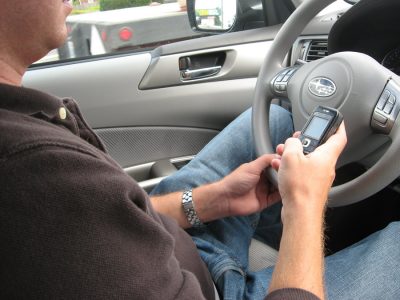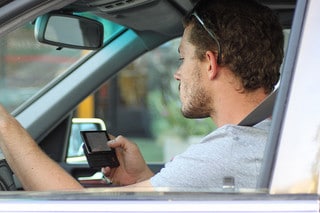
Driving has become so routine in our lives that sometimes we think it is harmless to multitask while we commute to work or run errands. It may be as simple as changing the radio station, finishing your lunch, or sending a text message, but any distraction is dangerous. Doing anything that pulls your focus off the road can not only put you in danger but can severely hurt others as well.
Table of Contents
Distracted Driving Covers More Than You Think
The US government gives this definition: “Distraction occurs any time you take your eyes off the road, your hands off the wheel, and your mind off your primary task: driving safely.” Notice how it’s not only your eyes that can be distracted—keeping your hands on the wheel and your mind on driving are just as important as keeping your eyes on the road.
There are many things that distract us while driving. Some of the more common distractions include:
- Eating and drinking
- Doing your hair or makeup
- Using a navigation system
- Looking at an event outside your vehicle
- Reading (this includes maps)
- Adjusting the radio, CD player, or MP3 player
- Retrieving an item from somewhere in your car
What wasn’t mentioned is the highest cause of distracted driving: cell phone use. Both phone calls and text messages (whether sending, typing, or reading) have caused millions of dollars in damage, thousands of deaths and injuries, and immeasurable grief and pain. Here are just a few of the staggering statistics.
Distracted Driving is More Dangerous Than You Think
At any one moment across America, over 660,000 vehicles are being driven by someone using a cell phone. That’s a scary prospect.
About 26% of all car crashes involve cell phone use. That includes hands-free devices! Research shows that the brain cannot multitask when the two tasks both require thought. You may be able to chew gum and walk at the same time (a non-thinking task and thinking task), but conversation and driving are both thinking tasks. This creates severe distractions with dangerous side effects for everyone on the road.
In fact, studies show that cell phone use causes severe “inattention blindness.” In this context, that means that drivers using a cell phone are blind to about 50% of their surroundings. This vision impairment can make red lights, stopped cars, and pedestrians impossible to see.
Sending a text message is also incredibly dangerous. Your brain, hands, and eyes are all distracted when you are texting while driving. On average, sending or reading a text takes about 5 seconds. When driving at 55 mph, that’s the equivalent of driving the full length of a football field blindfolded. Though texting is a great way to keep in touch with our friends and family, it can wait a few moments until you are no longer on the road. Our friends and family care more about our safety than they do our texting response time.
You Can Help Stop Distracted Driving
The reality of distracted driving is that it is entirely preventable. There are things we all can do to be more aware while driving and avoid these accidents.
Turn off your electronic device and place it out of reach while driving. If you must make a call or send a text message or email, pull off to the side of the road before turning on your device. Then, complete your task and return the device to its off and out of reach position. When you are driving with a passenger, have them take or make the call. This keeps your focus completely on the road.
Be a good role model for younger drivers. Talk to your teens about responsible driving and don’t drive distracted with children (or anyone else, for that matter) in your car to provide a good example.
You can also take a pledge to end distracted driving by committing to drive phone-free. Pledge to protect lives by never talking or texting while driving, being a good passenger and speaking up if the driver is driving distracted, and encouraging friends and family to drive phone-free. Take the official pledge here.
Ending distracted driving starts with you. Don’t do anything that could keep your attention off the road. This won’t save just your life, but others on the road as well.
